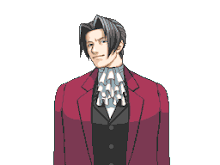
It could be said that Miles Edgeworth, the series’ first main prosecutor and Phoenix Wright’s closest friend, is a pretty popular character, well-loved for his suave demeanor and witty performances in court. At the very least, he was the prosecutor chosen to star in Capcom’s spin-off game, Gyakuten Kenji, as opposed to someone else. However, there are arguably at least a few other qualities that set him apart from the other three main prosecutors—Franziska von Karma, Godot and Klavier Gavin—and my interest in Edgeworth as a character has led me to write about these.
Perhaps most striking about Edgeworth is that he is the only prosecutor who does not seek the protagonist out for his own personal reasons. Just the opposite, Phoenix is the one seeking Edgeworth out so he can confront him about the “demon prosecutor” rumors. This stands in stark contrast to the other three, who (at least initially) go up against the protagonist with their own personal vendettas: Franziska wants to beat Phoenix as “revenge” against Edgeworth; Godot wishes to do the same out of contempt for Phoenix’s character and the fact that he blames Phoenix for Mia’s death; even Klavier first faces Apollo with the express intent of appraising the skill of “the little boy who bested [his] brother.” As further proof that he sought out Apollo, Klavier states that he had to “cancel a show or two” to be there, but that “[he] wouldn’t miss this day in court for the world.”
A characteristic of Edgeworth which is just as noticeable is that, at least compared to the other three, he treats his opponent rather humanely and respectfully. It is true that he fairly frequently belittles Phoenix, often with a condescending smile, but it is just as true that Phoenix often does and says things in court that are deserving of at least some degree of scorn. Franziska and Godot, meanwhile, are nowhere in the same universe as common civility. Franziska mercilessly whips Phoenix and childishly calls him a fool countless times, while Godot does not even deign to get Phoenix’s name right, insults him at almost every opportunity, and even throws his mug full of scalding hot coffee at him on occasion. Though Klavier is definitely more civil than the other two, even he is somewhat contemptuous, often mocking Apollo without provocation and calling him “Herr Forehead.” (On a related note, another indication of Klavier’s slightly scarred character is that he laughs when he informs Wocky Kitaki that he could die soon. Granted, Wocky is the son of gangsters, reasonably suspected of murder and a punk to boot, but still.)
One last quality that distinguishes Edgeworth is that he has no real gimmick (unless you want to count his frilly cravat and manner of dress in general), no quirk to associate with him, no memorable theme song. Franziska, though she has no theme either, definitely has her whip, which has got to be the definition of the words “gimmick” and “quirk.” Godot, too, will forever be remembered for his iconic coffee mug (and the plethora of questionable coffee metaphors that came with it) almost as much as for his catchy theme. Klavier more than holds his end up too, with his rock-star side job and persona, complete with a rockin’ theme. With such flamboyance and swagger coming from the other three, Edgeworth looks pretty plain in comparison, but his character shines all the more because he relies on no gimmick to be compelling.
